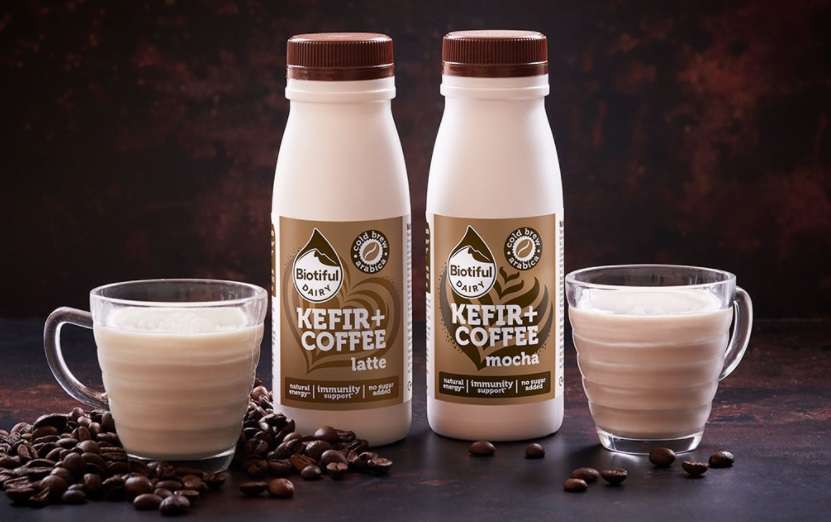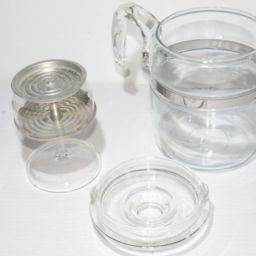
Kefir and coffee are two beloved beverages enjoyed by many for their unique flavors and health benefits. But have you ever considered combining the two? In this article, we’ll explore whether you can use kefir in coffee, blending the probiotic richness of kefir with the energizing kick of coffee.
Key Takeaways
- Incorporating Kefir: Yes, you can add kefir to coffee, but it’s not as straightforward as pouring milk or cream. The key is how you do it to enjoy both the taste and health benefits.
- Avoiding Curdling: To prevent curdling, it’s best to mix kefir with cold coffee or a cold brew. This approach ensures you get a smooth, enjoyable drink without the unwanted separation.
- Boosting Health: Combining kefir with coffee isn’t just about taste; it’s also a way to enhance your beverage’s nutritional profile, adding probiotics to your morning routine.
Can You Use Kefir In Coffee?
Absolutely! But there’s a twist. Kefir, a fermented milk drink loaded with probiotics, offers a tangy flavor and numerous health benefits. When it comes to coffee, though, the heat is a game-changer. Hot coffee can lead to curdled kefir, which is not a pleasant experience. The solution? Go cold. Cold brew or iced coffee is your best bet for a smooth mix.
Combining for Health and Flavor
Mixing kefir with coffee is like joining forces for your well-being. Kefir’s probiotics support gut health, while coffee’s antioxidants fight free radicals. Together, they’re a powerhouse. But remember, the taste is unique. Kefir isn’t milk or cream—it’s tangier. So, if you’re up for a new flavor adventure, give this combo a try.
The Perfect Mix
Here’s how to do it right: Start with your favorite cold coffee. Gradually add kefir, stirring gently. Taste as you go to find the perfect balance for your palate. Sweeten if desired, but let the natural flavors shine. And there you have it—a refreshing, probiotic-rich coffee to kickstart your day.
What is Kefir?
Kefir is a fermented beverage, traditionally made from cow’s milk, although goat, sheep, and even non-dairy alternatives exist. It’s a probiotic powerhouse, teeming with beneficial bacteria and yeasts that contribute to gut health. Its taste? Tart and slightly acidic, a bit like yogurt, but with a unique kick.
Health Benefits and Variations: Kefir’s health benefits are vast. It supports digestion, boosts immunity, and can even improve bone health. The variations? Beyond dairy, there’s water kefir, which offers similar probiotic benefits without the dairy content, catering to those on vegan or lactose-intolerant diets.
Coffee – A Brief Overview: Coffee, on the other hand, is a global morning staple. Its primary allure? Caffeine, providing that much-needed energy boost. But coffee is more than just caffeine; it’s also rich in antioxidants and has been linked to various health benefits, from lowering the risk of certain diseases to improving mental focus.
Compatibility with Kefir: Now, mixing kefir with coffee might sound unconventional, but it’s an exploration of taste and health. The tanginess of kefir can add a new dimension to your coffee, while coffee’s robust flavor can offer a counterbalance to kefir’s tartness.
The Science Behind Mixing
When you mix kefir with hot coffee, you risk curdling due to the heat and acidity. But, when combined with cold or iced coffee, kefir retains its smooth texture. This cold mix ensures that the probiotics in kefir remain intact, offering their full health benefits alongside the caffeine kick from coffee.
Avoiding the Curdle Hurdle
Mixing kefir with hot coffee? You might end up with a curdled surprise. To keep things smooth, pair kefir with cold or iced coffee. The cooler temperature prevents the proteins in kefir from clumping together, ensuring a silky blend.
Finding Your Perfect Mix
There’s no one-size-fits-all ratio for kefir and coffee. Start with a splash of kefir in your cold coffee and adjust to taste. Some prefer a subtle tanginess, while others might enjoy a more pronounced kefir flavor. Dairy kefir brings creaminess, while water kefir offers a lighter alternative. Experiment to find your ideal balance.
Creative Concoctions
Why not spice things up? Try a kefir coffee smoothie by blending cold brew, kefir, a dash of honey, and ice. Or whip up a kefir iced latte, layering cold coffee over ice and topped with frothy kefir. The possibilities are as vast as your imagination!
Potential Health Benefits
Gut-Friendly Goodness: Kefir is a probiotic hero, fostering a healthy gut microbiome. These beneficial bacteria can aid digestion, combat harmful bacteria, and even support immune function. When combined with coffee, you’re not just getting a caffeine boost; you’re nurturing your gut health too.
Energize and Clarify: Coffee’s caffeine content sharpens focus and increases alertness. When paired with kefir, you’re not just energized; you’re also consuming nutrients that support overall well-being. It’s a duo that wakes you up and supports your body.
Lactose Intolerant? No Problem: Kefir is often well-tolerated by those with lactose sensitivity, as the fermentation process breaks down much of the lactose. If you’re lactose intolerant, kefir might be a creamy addition to your coffee without the discomfort. Always listen to your body and choose what works best for you.
Exploring the Alternatives: Non-dairy kefir, made from coconut, almond, or even water, offers a vegan-friendly way to enjoy the probiotic benefits without dairy. These varieties maintain the fermented, tangy character of traditional kefir, making them a unique addition to your coffee routine.
Health Benefits in Your Cup: Non-dairy kefir packs a probiotic punch, supporting gut health and digestion, much like its dairy counterpart. When mixed with coffee, it introduces a light, refreshing twist while still offering those gut-friendly benefits, making your morning brew a probiotic powerhouse.
User Experiences and Expert Insights
Coffee enthusiasts who’ve ventured into the kefir realm often share positive feedback, noting the added depth and unique flavor profile kefir brings to their favorite brew. Some appreciate the tangy kick; others enjoy the smoothness it adds to cold brews.
Experts Weigh In
Nutritionists and health experts echo the sentiment, highlighting the symbiotic relationship between coffee’s antioxidants and kefir’s probiotics. This combo is seen not just as a taste enhancer but also as a way to elevate your beverage’s nutritional value.
Personalizing Your Brew
Experimentation is key, with coffee lovers finding their sweet spot for kefir ratios and discovering which type of kefir complements their coffee best. Whether it’s a splash in a cold brew or a blend in a smoothie, the versatility of kefir in coffee is a journey of taste and wellness.
FAQs
Can I use flavored kefir in my coffee?
Absolutely! Flavored kefir can add an extra dimension of taste to your coffee. Whether it’s vanilla, berry, or any other variety, flavored kefir can enhance your coffee experience with new and exciting tastes.
How can I sweeten kefir coffee?
If you find kefir coffee a bit tart, sweeten it with natural sweeteners like honey or maple syrup. These can complement the tangy flavor of kefir without overpowering the unique blend of tastes.
Can kefir coffee be consumed cold?
Yes, kefir coffee is great when enjoyed cold. In fact, mixing kefir with cold brew or iced coffee is recommended to prevent curdling and maintain the probiotic benefits of kefir.
Final Thoughts
Kefir in coffee is more than just a trend; it’s a fusion of health and flavor that offers a unique twist on your morning ritual. Whether you prefer dairy or non-dairy, flavored or plain, there’s a kefir coffee combination out there for you. Embrace the experiment and discover a new favorite way to enjoy these two beloved beverages together.









